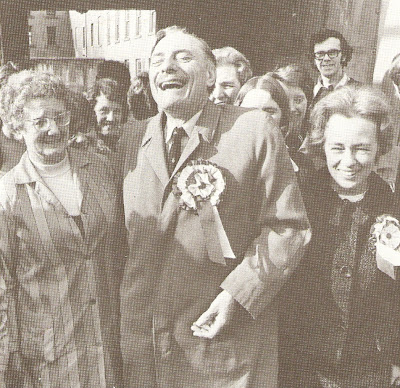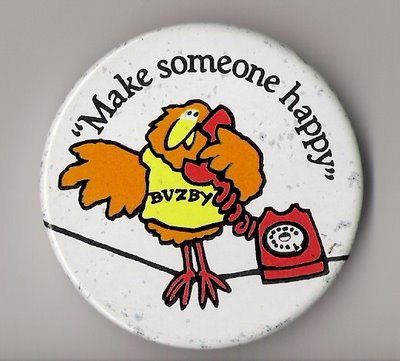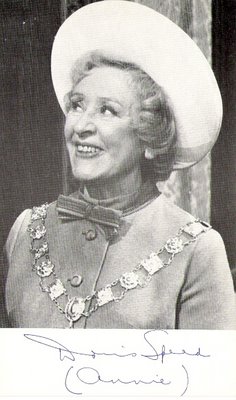 "We're so pretty..."
"We're so pretty..."Being a grotty working class kid in the 1970s, who has not many fond memories of the decade, I asked two older acquaintances of mine for their opinions. Here's the first, from Martin, now aged 54...
I hated the 1970s for a lot of their run. I suppose I resented missing the 1960s, because although I remembered them, I wasn't really part of them. I'd been a kid. But that was the decade, we '70s youths were told, where it was all happening. The '60s, oh, and the 1950s, too. Our elders chortled smugly about Teddy Boys and the Summer Of Love, and it almost felt like they were trying to destroy us. They had had it all. We had a heap of crap.
Employment wasn't that easy to come by in the 1970s, and I spent a couple of lengthy spells on the dole. People like Noele Gordon in Crossroads were wearing the funky, cutting edge late 1960s fashions... it was awful.
There was a sense of school playground anger and boisterousness in some early '70s mainstream pop, like Slade, or it was back to the '50s with Alvin and Showaddywaddy.
And then there were Pink Floyd, and Led Zep. Like the 1960s never left
It's Yesterday Once More, sang The Carpenters, and there was lots of nostalgia around.
Some male pop stars wore eyeliner, but made it absolutely plain they weren't queer.
Danny La Rue had done the cross-dressing bit far better years earlier.
Disco music was naff - a synthetic dance formula - and UK discos were mostly naff dives. Nothing like those you see on the telly. We called our local disco "the meat market" - because you went there to "pull", and many times it closed early for the night because of blood on the dance floor.
And discos were a 1960s innovation in the UK, we were often reminded by our self-obsessed elders.
And then came Punk. John Lydon later said that he put a stop to the 1970s, because somebody had to, but that wasn't the case. Abba were also king.
But Punk gave us something real, something actually from the heart of the '70s, something that was not vapid pop. 1950s guitar riffs may have been featured in some Punk stuff, we may have worn torn old clothes, but Punk actually said something about the 1970s, it said things were shit. Things were hopeless. There was nothing good. No future!! And even Punk itself was a rip-off. Worthless.
Punk was energy, Punk horrified the older people, they couldn't claim it as '50s or '60s.
Flares were everywhere in the 1970s. I'm surprised our houses weren't flared. But it was made plain by the smug elders that the fashion for flares began in the 1960s. And Punk said: "You take your flares, and you take your 1960s and shove 'em where the sun doesn't shine!"
God Save The Queen was artificially kept off the No 1 spot for the Silver Jubilee week in 1977. It was really No 1. We knew that.
Punk was the real legacy of the 1970s. The really happening thing. Every time I see a '70s TV show where everybody looks 1960s and talks '60s jargon ("Groovy"! Well out of fashion in the '70s - and in fact did anybody ever say it?) I want to throw up.
"I did it my way!" said Sid Vicious. And then in early 1979, he was dead, along with Nancy Spungen.
Punk's Not Dead! we screamed.
But it was. It had been dying since it was born. It came suddenly. It thrashed in, ranting, ripped, wild-eyed, sniffin' glue...
And suddenly it was dead.
You saw a lot of people in Punk gear from 1979 until about 1982. But it was just wearing the clobber. Empty.
In mid-1979, the mainstream music scene was focusing on a '60s Mods/Ska revival and what the 1980s were going to be like. Better get ready. Gary Numan started cranking up his synthesiser.
Oh, God, no!! I screamed.
Lyrics you'd need a psychiatrist to work out, and a monotonous sound which took us into the next decade.
There'll never be anything as real as Punk again, ever. The posturing hippies of the '60s were not as real as Punk (Peace and Love? Drugs and shagging, more like!). The terrible '80s posers with their god-awful dress-sense and hair-dos were never as real as Punk (although they were real, just vapid).
Punk was so real it hurt.
Three years of the 1970s amounted to something as far as I was concerned. The rest was tedium. And that's now been rewritten for today's kids so it's not real.
But Punk was real.
And I'm so glad I was there.
It was worth the waiting.
People need to stop pretending the '70s were the '60s.
Punk's worth more than fantasy.
But then people are so pathetic nowadays. And John Lydon's been advertising Country Life English butter.
Pretty vacant...

























.jpg)






















